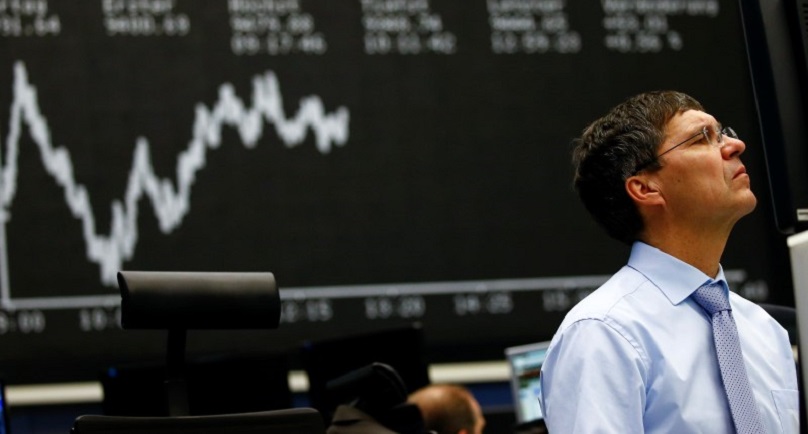Image: A trader works at his desk in front of the German share price index, DAX board, at the stock exchange in Frankfurt, Germany, January 21, 2016. EUTERS/Kai Pfaffenbach
By Richard Leong
NEW YORK (Reuters) – A renewed slump in oil prices due to a persistent global supply glut hurt U.S. and European stock markets on Monday and weighed on the dollar following a rebound in those sectors late last week.
Anxiety over the impact of tumbling energy prices on global economic growth and central bank policies revived safe-haven demand for the yen, gold and U.S. and German government debt.
Crude oil prices fell as much as 6.7 percent as Iraq announced record-high oil production that will feed into an already oversupplied market, wiping out much of the oil price gains from of the biggest-ever daily rallies on Friday.
“Right now, you could track the direction of stocks when you see where oil is trading,” said Brian Jacobsen, chief portfolio strategist at Wells Fargo Funds Management in Menomonee Falls, Wisconsin.
The oil-led market turbulence since the start of 2016 has raised hopes of more stimulus from major global central banks.
Last week, European Central Bank chief Mario Draghi signaled the bank was open to more monetary stimulus to combat weak growth and inflation in the euro zone.
Traders have bet the Federal Reserve would seek to soothe financial markets after its two-day meeting on U.S. monetary policy that will begin on Tuesday.
Global markets slumped at the start of the year on fears that a slowdown in world No. 2 economy China would spread to the rest of the world, and oil prices sank to 13-year lows.
German business confidence deteriorated to an 11-month low in January, a survey showed, suggesting growing concern among company executives in Europe’s largest economy.
“If the Fed puts too much emphasis on global developments, that could really harm sentiment,” Jacobsen said.
U.S. interest rates futures implied traders placed a 13 percent chance the Fed will hike rates this week.
The Dow Jones industrial average closed down 208.29 points, or 1.29 percent, at 15,885.22, the S&P 500 ended 29.82 points, or 1.56 percent, lower at 1,877.08 and the Nasdaq Composite finished 72.69 points, or 1.58 percent, lower at 4,518.49.
The pan-European FTSEurofirst 300 index finished down 0.7 percent, while Tokyo’s Nikkei ended 0.9 percent higher.
The MSCI all-country World Equity Index fell 0.8 percent to 364.90.
Losses in oil and Wall Street pushed the greenback lower. The dollar index, which tracks the greenback versus a basket of six currencies, slipped 0.3 percent, to 99.254.
The yen rose 0.4 percent against the dollar at 118.30 yen, and was steady against the euro at 128.41 yen.
Brent crude oil futures was down 6.7 percent to $30.03 a barrel, while U.S. crude dropped 7.6 percent to $29.75.
Iraq’s oil ministry told Reuters on Monday that oil output reached a record high in December, putting oil prices under renewed pressure.
U.S. 10-year Treasury yields were down over 3 basis points at 2.01 percent, and the 10-year German Bund yield was down 1 basis point at 0.397 percent, as the fall in oil prices underpinned support for safe-haven debt.
Spot gold rose 0.9 percent to $1,108.21 an ounce.
(Additional reporting by Dhara Ranasinghe and Patrick Graham in London; Editing by Bernadette Baum and James Dalgleish)
Copyright 2015 Thomson Reuters. Click for Restrictions.


